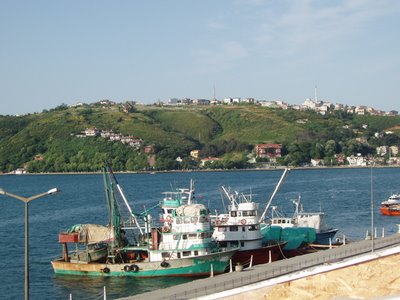
The Dervish House by Ian McDonald, though mainly a sci-fi story about technology in the near future of 2027, is also a political novel about Turkish history and its imagined future. The uneasy relationship between the remnant of Greek residents and the majority Turkish population is treated in an interesting way through several characters. Ethnic Turks, Greeks, Armenians, Kurds, and Jews all have at least a small role in the story. The city itself -- and the crumbling Dervish House of the title -- have big roles in the story.
The history of Turkish persecutions and population transfers in the 20th century, including the coup of 1980, is key to the personal history of several characters, especially a Greek economist who lives in the Dervish House along with several other main characters. Although at the beginning, he’s an old man who doesn’t go out much, he’s suddenly drawn into a very involved plot involving extremely futuristic nanoscience as well as complexity theory and several other trendy science topics. We learn slowly how his career was ruined years earlier by prejudicial treatment by his professional colleagues and the administration at Istanbul University, and how this one event makes him feel at least somewhat vindicated.
The economist’s understanding of a variety of theories enables him to figure out and help to pin down and stop a dangerous conspiracy. As he acts, we learn of his memories of his experiences in twentieth century Istanbul. Although he and his Greek and Jewish friends and family were extremely Turkish in their sense of identity, they were branded as disloyal, and exiled or worse. Both he and another character, an antiques dealer, also allow the author to present a capsule version of the presence of these minority groups in the longer history of the city.
Istanbul was on my list of cities with secular Jewish populations that I plan to study in the course of this year (so far, I’ve done some work on Odessa and Vienna). Earlier, when I looked into this subject, I didn’t find much about secular Jewish life in Istanbul. Jews seem to have remained relatively observant, or at least not to have called attention to any secular points of view as they did in several other cities. I didn’t expect to find such relevant ideas a Sci-Fi book (or whatever speculative fiction genre this book may belong to).
Overall, I found The Dervish House to be a good read for a number of reasons including the social, political, and science fiction, the careful use of historic detail, the convincing portraits of a wide range of characters, and a suspenseful plot.

I love the way he describes the city: I could often picture the places where actions occurred, based on my visits to Istanbul. I especially remember watching the ships on the Bosphorous (above) and seeing the bridge where some of the action takes place (top of post).
This post was written for my other blog, Hero or Anti-Hero.
No comments:
Post a Comment